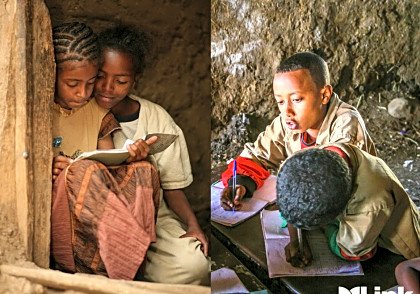Written by Cecilia
Within the annual International Literacy Day promoted by UNESCO, literacy has always been celebrated as an empowerment tool, a means to reach the main pillars of sustainable development: economic development, social development and environmental protection. Knowledge is power and education empowers to the extent that it enables people to determine their own destiny. Education is therefore at the basis of individual growth and international development.
Literacy is also a basic human right and it is the basic condition to enjoy all the other human rights. Literacy is a gate opener to the world to the extent that it is a tool to promote social and political participation. Apart from the social and political value conferred to literacy, it is important to underline the link between education and health as well. “Healthy learners learn better and better educated learners have the knowledge and skills to be healthy”. Furthermore, education is the social remedy to fight the spread of diseases such as HIV/AIDS.
Reading and writing are an outlet to people’s, especially children’s imagination. Within a reading culture, people, especially children, are encouraged not only to read, but to enjoy the pleasure of reading. The African proverb: “It takes a village to raise a child” could be transformed in “it takes a village to raise a reader”. Everyone in a community plays an important role in the welfare and development of children. Within a reading culture, reading is highly valued and appreciated in the society. A reading culture can be created by improving a reading environment in and out of school. “A socio-cultural perspective posits that all learning and literacy development occurs within social and cultural context”. Libraries are a cultural institution and play a critical role in shaping attitudes towards and practices of reading. It is important to re-think what it means to read for pleasure and to re-assess what counts as reading in today’s world..
With all this in mind, we’re really pleased to report to you the results of the second year of our Literacy & Libraries programme. Working in partnership with The Waterloo Foundation, Jolly Phonics, and our sponsors and supporters, 46 schools took part and received:
1- Phonics trainings
2- Librarian training and library improvement grant
3- Weak readers’ tutorial scheme
4- Reading bee competitions and reading clubs
5- Volunteers support
The Library and Literacy programme aims at making libraries attractive to students and transforming libraries from spaces to store books into hubs for reading. Volunteers from the UK and Jolly Phonics provided training in English phonetics and reading, participatory methods and use of resources. Librarians and directors have been trained with practical advises on how to manage the library and engage students. With a focus on extra-curricular programmes, such as reading bee and competitions and school clubs for weak readers, children have been motivated not just to read but to read for pleasure.
And the impact? Libraries and Literacy students improved their average score from 17% to 37% at the end of the year (where 100% would be expected for a student of the same grade who was a native English speaker). Students doubled their original performance and adding 14% to the improvement seen in control schools.
A record number of schools achieved gold and silver library awards in 2014-15. This led to a direct increase in the number of students using the library and the number of books lent to students. Above and beyond the data, case studies of individual teachers and students illuminate the opportunities offered through participation:

We’re so pleased to hear stories like this – and Mekdes is far from alone! We estimate that 2410 students are now attending their school library every week – an increase from before the project of approximately 677%!
We want to see the project continue for a Third year – expanding the project to more rural schools, developing the skills and knowledge of teachers and librarians at the schools already involved and involve many, many more students. Watch this space!